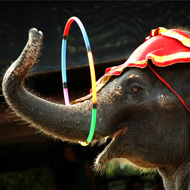Ireland bans wild animals in circuses

The minister said the ability of a travelling circus to provide fully for wild animals such as camels and tigers is ‘no longer a tenable proposition’.
The use of wild animals in circuses is set to be banned in Ireland, with new legislation coming into force on 1 January 2018.
Michael Creed, Ireland’s minister for agriculture, food and the marine, said the practice “can no longer be permitted”, as he signed the regulations.
“This is a progressive move, reflective of our commitment to animal welfare,” he added.
There will be a “modest” lead-in period to allow circus owners to make alternative arrangements for their animals.
Whilst the minister recognised there may be some regret among circus owners and operators, he said the ability of a travelling circus to provide fully for wild animals such as camels and tigers is ‘no longer a tenable proposition’.
Mr Creed added: “While the retirement of the small numbers of wild animals in Irish circuses might seem like a loss I am confident that this move will do more to secure the future of the circus community. Coming in line with modern welfare standards will mean that greater numbers of the public will be more comfortable with going to the circus.”
The new regulations form part of the Animal Health & Welfare Act 2013, a major piece of legislation that updated and replaced about 40 pieces of primary animal health and welfare legislation.
A bill to ban wild animals in circuses has reached stage two for further scrutiny in Scotland. Meanwhile the Welsh Government recently consulted on mobile animal exhibits and asked whether a ban on wild animals in circuses should be considered.
In England the government has committed to a ban but it is unknown when the legislation - which was drafted and scrutinised in 2013 - will be introduced.



 The Animal and Plant Health Agency (APHA) has updated its online reporting service for dead wild birds.
The Animal and Plant Health Agency (APHA) has updated its online reporting service for dead wild birds.